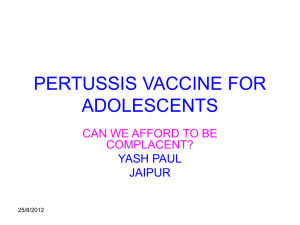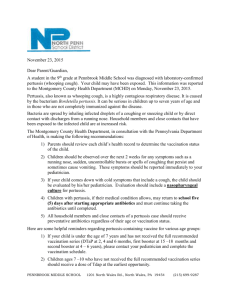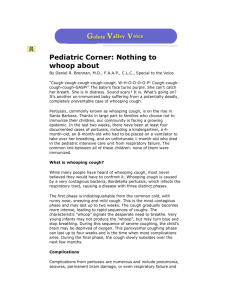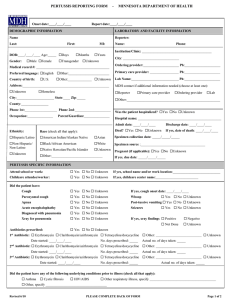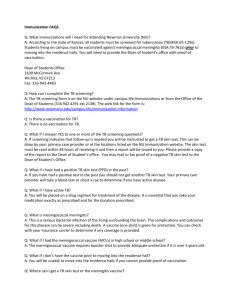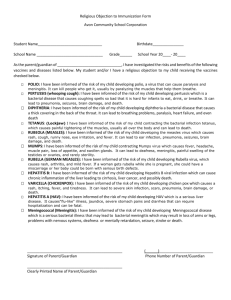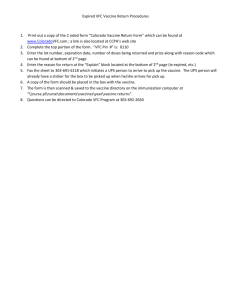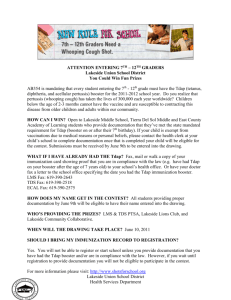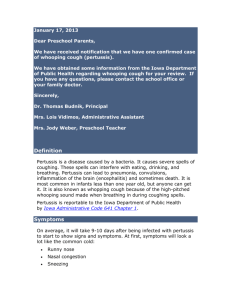September 4, 2012 Dear Parents, Guardians and Students, Indiana
advertisement
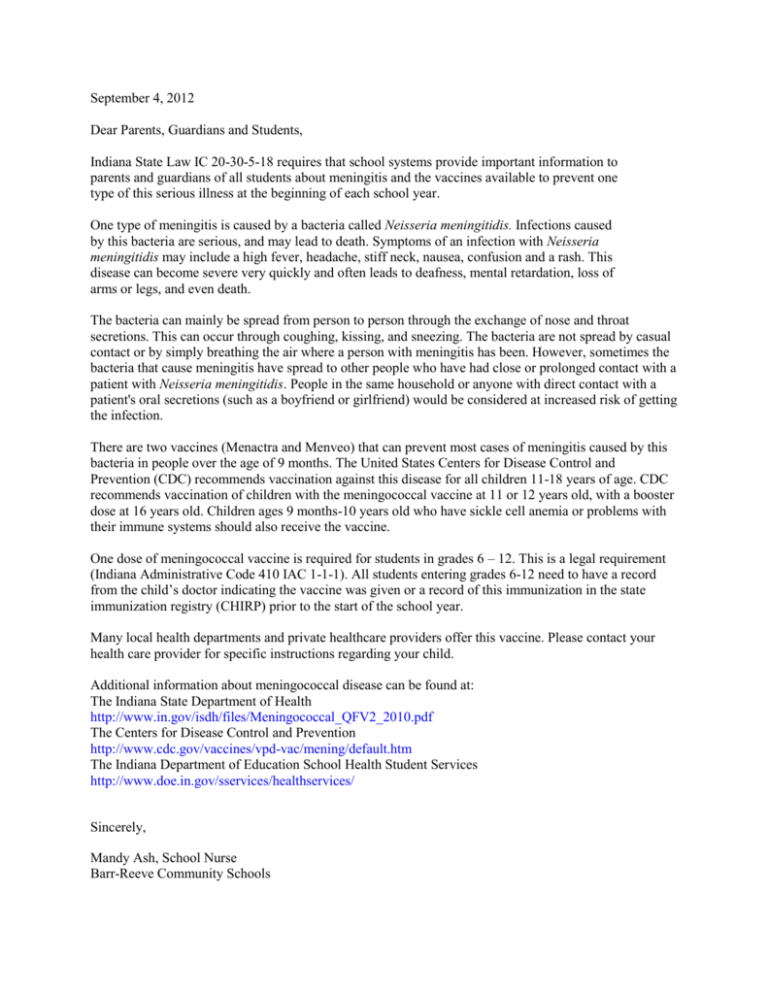
September 4, 2012 Dear Parents, Guardians and Students, Indiana State Law IC 20-30-5-18 requires that school systems provide important information to parents and guardians of all students about meningitis and the vaccines available to prevent one type of this serious illness at the beginning of each school year. One type of meningitis is caused by a bacteria called Neisseria meningitidis. Infections caused by this bacteria are serious, and may lead to death. Symptoms of an infection with Neisseria meningitidis may include a high fever, headache, stiff neck, nausea, confusion and a rash. This disease can become severe very quickly and often leads to deafness, mental retardation, loss of arms or legs, and even death. The bacteria can mainly be spread from person to person through the exchange of nose and throat secretions. This can occur through coughing, kissing, and sneezing. The bacteria are not spread by casual contact or by simply breathing the air where a person with meningitis has been. However, sometimes the bacteria that cause meningitis have spread to other people who have had close or prolonged contact with a patient with Neisseria meningitidis. People in the same household or anyone with direct contact with a patient's oral secretions (such as a boyfriend or girlfriend) would be considered at increased risk of getting the infection. There are two vaccines (Menactra and Menveo) that can prevent most cases of meningitis caused by this bacteria in people over the age of 9 months. The United States Centers for Disease Control and Prevention (CDC) recommends vaccination against this disease for all children 11-18 years of age. CDC recommends vaccination of children with the meningococcal vaccine at 11 or 12 years old, with a booster dose at 16 years old. Children ages 9 months-10 years old who have sickle cell anemia or problems with their immune systems should also receive the vaccine. One dose of meningococcal vaccine is required for students in grades 6 – 12. This is a legal requirement (Indiana Administrative Code 410 IAC 1-1-1). All students entering grades 6-12 need to have a record from the child’s doctor indicating the vaccine was given or a record of this immunization in the state immunization registry (CHIRP) prior to the start of the school year. Many local health departments and private healthcare providers offer this vaccine. Please contact your health care provider for specific instructions regarding your child. Additional information about meningococcal disease can be found at: The Indiana State Department of Health http://www.in.gov/isdh/files/Meningococcal_QFV2_2010.pdf The Centers for Disease Control and Prevention http://www.cdc.gov/vaccines/vpd-vac/mening/default.htm The Indiana Department of Education School Health Student Services http://www.doe.in.gov/sservices/healthservices/ Sincerely, Mandy Ash, School Nurse Barr-Reeve Community Schools September 4, 2012 Dear Parents, Guardians and Students, The Indiana State Department of Health and the Indiana Department of Education have asked that school systems provide important information to parents and guardians of students about pertussis (whooping cough) and the vaccines available to prevent this serious illness. Pertussis is a highly contagious respiratory infection caused by the bacteria Bordetella pertussis. Pertussis is spread by droplets created when an infected person coughs or sneezes. Infants and young children are usually vaccinated against pertussis, but the vaccine becomes less effective as children get older, and vaccinated children can become infected. Pertussis causes severe coughing fits that can persist for weeks or months. During a coughing fit, the infected person may be short of breath. The coughing fit may be followed by vomiting and exhaustion. Young infants are at highest risk for developing complications from the disease like pneumonia, seizures, and death. Teens and adults who received the pertussis vaccine when they were younger might have milder disease if they get sick with pertussis, but they can still spread it to others. The United States Centers for Disease Control and Prevention (CDC) recommends a pertussis vaccine (Tdap) for all 11-18 year old children. The Tdap vaccine, which protects against tetanus and diphtheria, as well as pertussis, can be given regardless of the time since receiving a regular tetanus booster (Td). CDC also recommends a dose of Tdap vaccine for all adults up to 65 years of age, and for adults 65 and older who have close contact with infants. Adults should talk to their healthcare provider about receiving a Tdap booster. The Tdap vaccine is required for all students in grades 6 -12. Please talk with your child’s healthcare provider about the Tdap vaccine. Additional resources for families to obtain information about pertussis disease include the following websites: The Indiana State Department of Health http://www.in.gov/isdh/files/PertussisQF2011.pdf The Centers for Disease Control and Prevention http://www.cdc.gov/vaccines/vpd-vac/pertussis/default.htm Sincerely, Mandy Ash, School Nurse Barr-Reeve Community Schools
